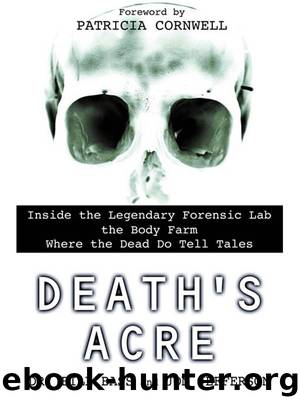Death's Acre by William M. Bass

Author:William M. Bass [Bass, William M.]
Language: eng
Format: epub
Publisher: Penguin Publishing Group
Published: 2004-10-05T04:00:00+00:00
CHAPTER 13
Parts Unknown
THE PHONE RANG, startlingly loud in the silence. It was July, and the university was practically a ghost town. The hallways were dim and deserted in the depths beneath Neyland Stadium. Most of the students and faculty had vanished in late May and wouldn’t reappear until late August. Understandably, they seized any opportunity to get out of the depths of the stadium. I, on the other hand, was spending nearly every waking moment down in my dark, dusty office. It had been months since Ann died, but I still couldn’t bear the emptiness of our house. At work, by contrast, I was surrounded by people. Most of them were dead, mind you, but they were comforting all the same. They had shared their stories with me and had entered my life; they were companions who would never abandon me. Besides, at work, I knew, it wouldn’t be long before someone would call me with an interesting case. So when the phone rang on this quiet summer day, I reached for it eagerly.
At the other end of the line was my secretary, Donna, whose office lay, literally, a football field away from my private sanctuary, tucked deep beneath the stadium’s east stands. She was transferring a call, she said, from Corporal James J. Kelleher of the New Hampshire State Police.
“Hello, this is Dr. Bass,” I said. Corporal Kelleher introduced himself. He worked in the major crimes unit, he explained, and was the lead investigator on a case he believed might involve a homicide. He had read about me in Bones, a book written by Doug Ubelaker, a former student, who was now a staff anthropologist at the Smithsonian Institution. (One of the things that thrills me when I look back on my career is the fact that three of the Smithsonian’s physical anthropologists—Ubelaker, Doug Owsley, and Dave Hunt—got their Ph.D.s from me, and I served on the doctoral committee for a fourth, Don Ortner.)
As Kelleher outlined the case, I began to take notes. A few handfuls of burned bone fragments had been found in a yard in Alexandria, he said, a tiny hamlet in the center of the state. The medical examiner thought they were dog bones, but Kelleher suspected they were human. If he was right—if the bones were indeed human—he needed a positive identification of the dead person; if possible, he also needed to know the manner of death. Kelleher asked whether I could help. “I believe I can,” I said. “I can sure try.”
Six days later, a well-wrapped FedEx package arrived; inside the layers of paper and bubble wrap was a box containing bone fragments—hundreds of them—burned to a crisp. By this time I’d examined dozens of burned bodies and thousands of burned bones; they’d been sifted and plucked from burned-up cars, burned-down houses, even a “blowed-up” fireworks factory, as some of the locals would say. But except for bones from commercial crematoriums, I had never seen bones so completely burned as these.
Nearly every forensic case represents a scientific jigsaw puzzle, figuratively speaking.
Download
This site does not store any files on its server. We only index and link to content provided by other sites. Please contact the content providers to delete copyright contents if any and email us, we'll remove relevant links or contents immediately.
When Breath Becomes Air by Paul Kalanithi(7263)
Why We Sleep: Unlocking the Power of Sleep and Dreams by Matthew Walker(5641)
Paper Towns by Green John(4169)
The Immortal Life of Henrietta Lacks by Rebecca Skloot(3826)
The Sports Rules Book by Human Kinetics(3588)
Dynamic Alignment Through Imagery by Eric Franklin(3488)
ACSM's Complete Guide to Fitness & Health by ACSM(3468)
Kaplan MCAT Organic Chemistry Review: Created for MCAT 2015 (Kaplan Test Prep) by Kaplan(3423)
Introduction to Kinesiology by Shirl J. Hoffman(3299)
Livewired by David Eagleman(3121)
The River of Consciousness by Oliver Sacks(2992)
Alchemy and Alchemists by C. J. S. Thompson(2911)
The Death of the Heart by Elizabeth Bowen(2901)
Descartes' Error by Antonio Damasio(2731)
Bad Pharma by Ben Goldacre(2729)
Kaplan MCAT Behavioral Sciences Review: Created for MCAT 2015 (Kaplan Test Prep) by Kaplan(2491)
The Gene: An Intimate History by Siddhartha Mukherjee(2491)
The Fate of Rome: Climate, Disease, and the End of an Empire (The Princeton History of the Ancient World) by Kyle Harper(2436)
The Emperor of All Maladies: A Biography of Cancer by Siddhartha Mukherjee(2431)
